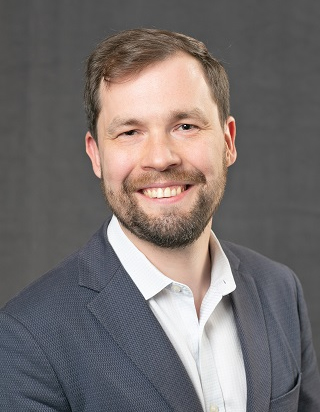Oct 10, 2024
New Gies professor Dmitriy Muravyev examines the options
You could almost say that the circle is now complete. When Dmitriy Muravyev left the University of Illinois in 2012, he had just graduated with his PhD, and now he is back as an associate professor of finance and Conrad W. and Shirley A. Hewitt Faculty Fellow, ready to teach and continue the research excellence he experienced as a student.
Muravyev remembers his time as a PhD student in Gies fondly: “It was this wonderful experience because you have so much freedom that you can explore whatever you like,” he said. “The great thing about the university of Illinois is that professors are really happy to see you and talk to you.”
And he was excited about the kinds of questions that the faculty were exploring. “They were working on the kind of questions that I was interested in – how the markets really function.”

After completing his degree, Muravyev went on to teaching positions at Boston College and Michigan State University before returning to Gies Business this year. “I am very excited to come back and join the Department of Finance at Gies because I think that it’s a superb department,” said Muravyev, who joined Gies this fall as a tenured associate professor. “It was great when I was a PhD student, and now it’s even better.”
One of Muravyev’s research interests in examining options markets. He was interested in finding out what traders do and why they do – trying to learn something about how they think. Recently, though, he worked on a project with coauthor Vincent Bogousslavsky to examine retail options investors at the trader level. They noted that during the COVID pandemic, people found themselves spending a lot more time at home, and many developed an interest in retail trading. So, these were not professional traders. And Muravyev was interested in learning more about the motivation for these people to get involved in retail trades. “The question is, what do those people do? What do those investors do in the option market and the stock market?” Muravyev said.
Most researchers had assumed that retail traders were looking at stock and options markets as essentially another form of gambling. “Everyone thought that those in the retail market were unsophisticated. I thought so, too,” he said. But the data indicated that retail traders were, in general, more sophisticated than he and others had expected. “They place so-called limit orders where you specify the price, you place it within the bidder’s spread. So, in terms of the execution, they don’t lose much money,” he explained.
And it turned out that gambling was not the main motivation for involvement in retail trading. What these traders seemed to be looking for was leverage to participate in high-priced stocks affordably. By trading options, they were able be involved in trades with larger companies that they would not have been able to work with if they had to buy stocks outright. “The main reason retail investors use options is to get leverage. If you are right, you can get a huge payout,” he said. “You can buy an option for a dollar, and if the trade moves your way, you can make $10.”
What was also interesting was that these traders’ approaches often flew in the face of what most professionals would do. “Another thing that was surprising – in every derivative options class, we teach certain strategies where you, say, take options combined with the underlying stock. It turns out that retail investors in practice almost never use those strategies. They want to do simple things, and the simple thing might be to buy a call and then hopefully the price goes your way.”
In the classroom, Muravyev will continue the experience he had as a student at Illinois by passing on his knowledge and interest in the world of finance. “I’ll be teaching undergraduate and graduate derivatives classes. I’m very excited about this because it’s one of my academic specialties,” he said. “I am also very excited because Illinois students have close proximity to Chicago, so we’ll have very many smart students who will be able to work for some of those trading firms from Chicago, and they’ll use this stuff in practice, which is particularly exciting.”
Muravyev hopes his courses will inspire students to keep an interest in his area: “I think it is important to not only transfer knowledge from my head into their head, but to really inspire them. They probably won’t remember all the formulas which we study in class, but if they remember that the derivatives class was something cool or something exciting, then later on they can come back and learn about it more closely.”
The culture of the College is also a positive for Muravyev. “We have amazing students here,” Muravyev said. “And I’m really impressed with what Jeff Brown did as dean, taking Illinois from the top Illinois state school into something much bigger – into this idea of education for all. I'm also very excited about the direction that Dean Elliott is taking the College with her boundless energy. I think that Illinois Gies is just one of the best business schools in the world on the combination of those factors: faculty, students, alumni engagement. The Gies and University of Illinois is a family, the students, professors, and alumni. I hope to be part of that family and work with everyone and make this place even better than it is. It’s already great.”


